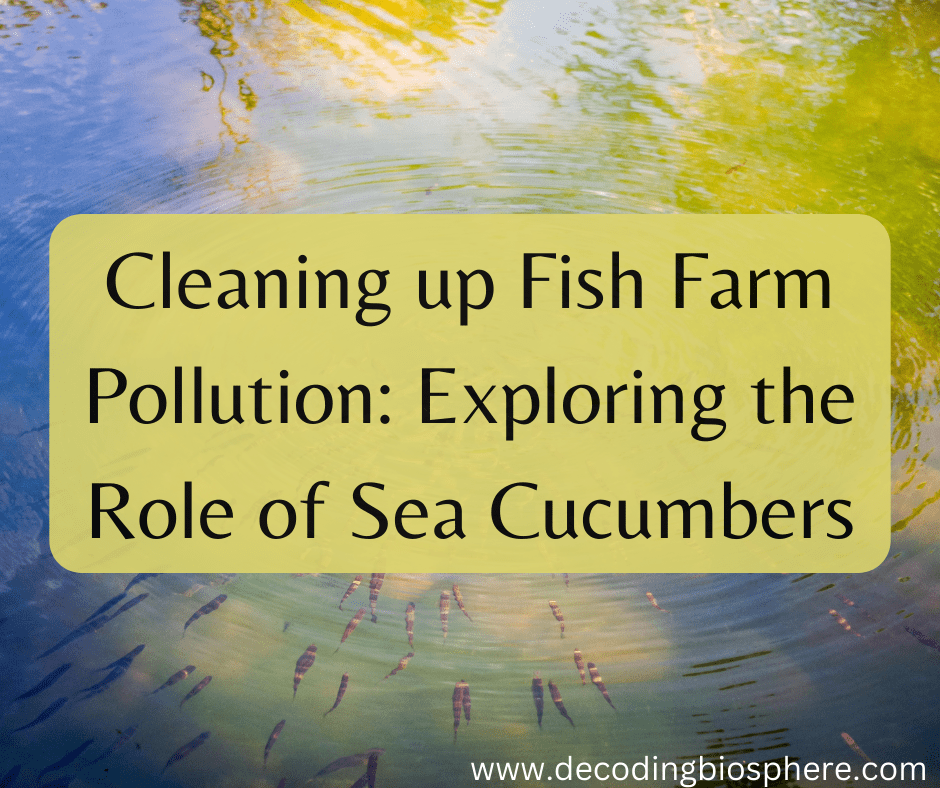Fish farming, also known as aquaculture, has become an essential industry to meet the growing global demand for seafood. However, this industry faces a significant challenge: the accumulation of waste products, such as excess nutrients and uneaten feed, which can lead to water pollution and environmental degradation. In recent years, scientists and researchers have been exploring innovative solutions to mitigate the negative impacts of fish farming. One intriguing option that has gained attention is the use of sea cucumbers as a natural cleanup solution. In this article, we look into the potential of these enigmatic creatures to tackle fish farm pollution and discuss the scientific evidence behind their efficacy.
Understanding Fish Farm Pollution:
Fish farms generate substantial amounts of waste, primarily in the form of uneaten feed and fish excretion. These organic materials release nitrogen and phosphorus into the surrounding water, which can lead to eutrophication—a process that promotes excessive algae growth and depletes oxygen levels, ultimately harming aquatic life. Additionally, fish farms can produce sediments that contain toxins, which pose further threats to local ecosystems. Thus, finding effective ways to manage and minimize these pollutants is crucial for the sustainability of aquaculture.
Enter the Sea Cucumber:

Sea cucumbers are marine invertebrates belonging to the echinoderm family. They are found in various oceans worldwide and play a vital role in maintaining marine ecosystems. While they might not be the most visually appealing creatures, sea cucumbers possess unique abilities that make them an interesting candidate for pollution control in fish farms.
Natural Filtration System:
One of the sea cucumber’s remarkable traits lies in its feeding behavior. These organisms are detritivores, meaning they consume organic matter found in sediments, including fish waste and uneaten feed. As they ingest these materials, sea cucumbers effectively filter out and recycle nutrients, thereby reducing the accumulation of pollutants in the water column. Their feeding habits can contribute to maintaining a healthier aquatic environment by preventing the onset of eutrophication and reducing the overall ecological impact of fish farming operations.
Bioremediation Potential:
Sea cucumbers possess another unique quality: they have a remarkable ability to break down and process organic waste. These organisms host diverse populations of gut bacteria that aid in the decomposition of organic matter. The gut microbiota of sea cucumbers produce enzymes capable of breaking down complex organic compounds, converting them into simpler forms that can be utilized by other organisms in the ecosystem. This bioremediation potential of sea cucumbers has piqued the interest of researchers as a promising method for mitigating the impact of fish farm pollution.
Enhancing Sediment Health:
In addition to their filtration and bioremediation capabilities, sea cucumbers can improve sediment health. By burrowing and moving through the sediment layers, these creatures help to oxygenate the sediments and promote better circulation. This process prevents the build-up of harmful anaerobic conditions and the release of toxins that could otherwise negatively impact the aquatic ecosystem. Sea cucumbers’ activities, therefore, can contribute to a healthier and more balanced environment around fish farms.
Challenges and Considerations:
While sea cucumbers show promise as a natural cleanup solution, implementing their use in fish farms does come with challenges. Some species of sea cucumbers have specific habitat requirements and may not be suitable for all types of aquaculture systems. Additionally, their breeding and cultivation can be complex, requiring careful management to ensure their survival and efficient waste-processing abilities. Furthermore, the economic feasibility of large-scale sea cucumber integration into fish farms needs to be assessed, as the cost-effectiveness of such an approach remains uncertain.
Final Take Away
The search for sustainable solutions to mitigate fish farm pollution is an ongoing endeavor. Sea cucumbers have emerged as a fascinating possibility due to their natural filtration, bioremediation potential, and sediment-enhancing abilities. While further research and development are needed to determine the feasibility and effectiveness of using sea cucumbers on a large scale, their unique characteristics make them a promising contender in the quest for cleaner and more environmentally friendly aquaculture practices. By harnessing the natural capabilities of these humble organisms, we may be able to strike a balance between meeting the demand for seafood and minimizing the ecological footprint of fish farming operations.

